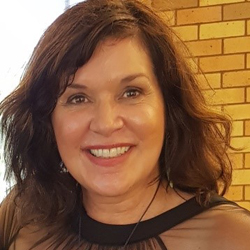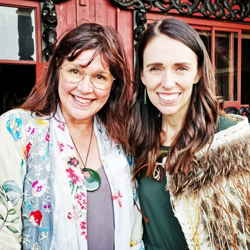
by Chellie Spiller
Professor, Waikato University, New Zealand
27 April 2020
Share this article:
Early in December 2019 over 300 women gathered at the Māori tribal marae of Ngāti Whatua in Auckland to pay tribute to Prime Minister Jacinda Ardern. The purpose of this event was to present Jacinda with a korowai, a woven cloak to wrap her in aroha (love) and let her know she was appreciated and that the women of NZ had her back. The korowai gifting was the vision of Dame Anne Salmond and Jo Brosnahan, along with Eddy Royal and NZ Poet laureate Selina Tusitala Marsh. There were no TV crews, no journalists. It was a moment to pause busy lives and honour a rangatira (leader), mother, daughter, sibling and role model. Women from all walks of political, cultural, religious life, age and experience were interwoven in an act of love and caring. Jo sent me a letter that set out the vision and ended with this prophetic statement:
Thank you for joining with us; for helping us to weave the threads of our experience and wisdom; to provide awhi and aroha. We believe this will be a powerful symbol of the strength of women, and the community of support we offer each other across the generations, to grow and progress towards a kinder future for all.
Paradoxically, a few months later, from our self-isolating bubbles we would be interwoven as a nation in a collective pledge to ‘Be Kind’ which is one of Jacinda’s COVID-19 messages to us alongside ‘Stay in Your Bubble to Save Lives’. These messages were part of her explanation of what has proven to be her wise and courageous decision to ‘Go Hard, Go Early’.2
The Māori word rangatira is widely recognised throughout New Zealand as synonymous with leadership. The word itself points to the qualities of leadership. Broadly the first part of the word raranga refers to weaving and the second part tira refers to a group. A rangatira leader is someone who weaves people together.3 This quality is very much evident in these times under the leadership of Jacinda Ardern as she effectively weaves her team of experts together and helps to interweave the peoples of our nation.
It is important, however, to acknowledge the sublime nature of rangatira leadership. Strength lies in people moving forward to express leadership as needed and moving back at other times. It is a movement, interplay and discerning complex of roles and responsibilities. Everybody is part of the textured whole. We see this in the many experts providing guidance to the Prime Minister and how Jacinda provides them with forums to also provide calm, steady assurance to communities. The heroes working in teams on the frontline also demonstrate the rangatira leadership approach as they sustain effectiveness during this lengthy and demanding time. Meanwhile other citizens play their part by being responsible and staying home while undertaking acts of kindness for others. As the Prime Minister announced on 20 April the plan for moving out of level 4 “…the effort of our team of million has broken the chain of transmission and taken a quantum leap forward in our goal to eliminate the virus” reinforcing the rangatira approach whereby each person has a role in the whole.4
Up and down New Zealand there are all manner of leaders in all levels of society — in their whānau (families), in their workplaces, tribes, communities. It is an individual and collective endeavour. For example, some communities have built upon Jacinda’s brilliant idea for a four-tier alert system based on the spread of the virus, which she introduced in her first pandemic address to the nation on March 21st.5 Many smaller communities have put themselves on “level 5” lockdown which is one level beyond the official “level 4” state of emergency, with local volunteers monitoring arterial roads encouraging “outsiders” to turn away. This is not to turn this into an “us” and “them” situation, rather it is to protect the vulnerable within – many of these communities have at-risk people with health issues. Māori are acutely aware of the 1918 flu pandemic that hit their communities hard. At the back of my tribal wharenui (communal meeting house) on the East Coast of New Zealand’s North Island, are two camelia trees. They were planted in 1918. Beneath these two trees lie a small group of people who died in the pandemic and were buried in a hasty grave, including my great, great grandfather Puhake Te Taite along with my great grandmother, Paranihia Tamihana and other members of the hapū (extended family).
A thriving ecosystem of rangatira leadership – where everyone is part of the textural whole – produces capable, critical thinkers who respond with many different forms of intelligence and experience to what is going on.
A rangatira leader is not above being tested; it is through being tested that collective intelligence can reveal itself. A thriving ecosystem of rangatira leadership – where everyone is part of the textural whole – produces capable, critical thinkers who respond with many different forms of intelligence and experience to what is going on. Rangatira leadership doesn’t mean we all agree – weaving inherently involves working with tension. Such as in the current economic disruption, where some businesses won’t make it and jobs are lost. Even intergenerational tensions have surfaced questioning how fair a level 4 lockdown is, as one commentator noted, some wonder if “the young are sacrificing so that the old can stay healthy, particularly because of the debt being taken on to fund stimulus spending.”6 The rangatira leader listens, is prepared to take feedback, and has the capacity to sit with dissenting voices, to listen, to take in feedback, and then take incisive, clear, unambiguous action with fierce resolve.
In our book, Wayfinding Leadership,7 we describe how great leaders in the ancient cultures of Māori and Polynesia are wayfinders who go beyond the known; on journeys of discovery to new horizons. Key to the wayfinder’s ability to do this is the quality of stillness that they have. They come from a place that is calm and grounded so that they can more incisively see what is going on even in the midst of a great storm. When the going gets tough – the tough get relaxed.
This rangatira approach takes leadership to another level where the leader can empower others to be moved, to act, and to lead as part of a journey together. It is to be a navigator between worlds – helping everyone move in a more grounded and sustainable way from the world that was to the new world that is becoming. This journey takes people to powerful new places within themselves, tapping into their human potential and capacity for transformational change.
Whaea Rose Pere, a tohuna tipua (wisdom keeper), explains the deeper layers embedded in the word rangatira. She says that humans are rā (light) who ngāti (belong to) rā (the light). In this view we all have self-worth and dignity as rangatira, rā ngāti rā, humans with divine origins who belong to Te Ao Mārama, the world of light with agency to bring light into the world in manifold ways.8
Being grounded in our bubbles is an opportunity to pause, listen, bear witness and co-create a korowai of love and a kinder future for all.
1Aotearoa is the Māori name for New Zealand. It was originally used by the Māori people in reference to only the North Island but, since the late 19th century, the word has come to refer to the country as a whole.
2 https://www.odt.co.nz/star-news/star-national/pm-stay-home-and-save-lives
3Spiller, C., Maunganui Wolfgramm, R., Henry, E., & Pouwhare, R. (2020). Paradigm warriors: Advancing a radical ecosystems view of collective leadership from an Indigenous Māori perspective. Human Relations, 73(4), 516-543.
4https://thespinoff.co.nz
5 https://www.nzherald.co.nz/nz/news/article.cfm?c_id=1&objectid=12320446
6 https://thespinoff.co.nz/the-bulletin/06-04-2020/the-bulletin-debate-on-when-to-leave-the-lockdown/
7 Spiller, C., Barclay-Kerr, H., & Panoho, J. (2015). Wayfinding leadership: Ground-breaking wisdom for developing leaders. Huia Publishers.
8Spiller et al. (2020).

Chellie Spiller is a full professor at the Waikato University, Hamilton, New Zealand. She is of Māori (Ngāti Kahungunu) and Pākehā (European NZr) lineage. Chellie is co-leader, with Erin Dixon and Brian Calliou, of the inaugural Indigenous stream at ILA’s 2020 annual conference in San Francisco and she was co-chair of ILA’s 2018 annual conference in West Palm Beach, Florida. The postcard series draws upon her 2015 co-authored book Wayfinding Leadership: Ground-Breaking Wisdom for Developing Leaders, with Hoturoa Barclay-Kerr and John Panoho. Her latest work is Paradigm warriors: Advancing a radical ecosystems view of collective leadership from an Indigenous Māori perspective, published in the Human Relations special issue on the collective dimensions leadership (Vol 73 Issue 4, April 2020).

Chellie Spiller with NZ Prime Minister Jacinda Ardern wearing the korowai

